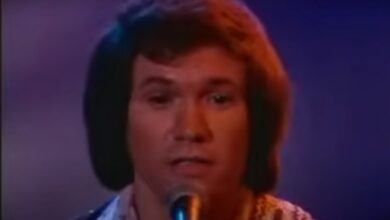Hank Locklin’s ‘Please Help Me, I’m Falling’ Captivates Country Music in 1960
In 1960, Please Help Me, I’m Falling by Hank Locklin emerged as one of the most defining country songs of its time. With its smooth, melancholic melody and heartfelt plea of a man struggling with forbidden love, the song struck a chord with listeners across the country. Released as a single in early 1960, the track quickly became a sensation, topping the Billboard Hot C&W Sides chart for an impressive 14 weeks and crossing over to the pop charts, peaking at No. 8 on the Billboard Hot 100. This success cemented Locklin’s place as a country star and helped shape the evolution of the genre in the early ‘60s.
Hank Locklin, born in Florida in 1918, had been a part of the country music scene for well over a decade before his biggest hit arrived. He was known for his smooth tenor voice and his ability to convey deep emotion with simple yet powerful lyrics. His early success came with Send Me the Pillow That You Dream On, which became a standard in country and pop music alike. Unlike many country singers of the era who leaned heavily into honky-tonk or Western swing, Locklin favored a more polished, Nashville Sound approach, which would define his biggest hits.
The inspiration for Please Help Me, I’m Falling came from the talented songwriting duo Don Robertson and Hal Blair. Robertson, known for his pioneering piano-based ballads, crafted a melody that featured a distinctive slip-note piano technique, later made famous by Floyd Cramer. The lyrics tell the story of a man struggling with temptation, torn between his current relationship and an undeniable attraction to someone else. The sincerity of the song’s plea, combined with Locklin’s heartfelt delivery, made it instantly relatable to audiences.
Recorded at RCA Studio B in Nashville, Please Help Me, I’m Falling was a product of the lush and refined Nashville Sound, a movement designed to bring country music to a wider audience. Producer Chet Atkins, one of the architects of this polished style, kept the arrangement simple yet effective. Floyd Cramer’s legendary slip-note piano work added a gentle but unforgettable touch, blending seamlessly with Locklin’s warm vocals and soft steel guitar accents. The result was a track that had all the traditional emotion of country music while maintaining a smoothness that appealed to pop listeners.
Upon its release, Please Help Me, I’m Falling was an instant success. It dominated the country charts, holding the No. 1 position for over three months, making it one of the longest-running country hits of the era. The song’s crossover success onto the pop charts was equally significant, proving that country music could appeal to mainstream audiences without losing its core identity. The song was nominated for Best Country & Western Recording at the Grammy Awards, further cementing its status as one of the biggest hits of the year.
The cultural impact of Please Help Me, I’m Falling was profound. It was one of the first songs to fully embrace the Nashville Sound, demonstrating that country music could be sophisticated while still maintaining its emotional depth. It also helped bridge the gap between traditional country and the emerging pop-influenced styles of the early ‘60s, paving the way for artists like Patsy Cline and Jim Reeves to find success in both markets.
For Hank Locklin, the song became his signature hit and elevated him to new heights in the country music world. Though he had already experienced success with previous recordings, Please Help Me, I’m Falling solidified his legacy as a premier balladeer. Following its success, he continued recording and touring internationally, even becoming one of the first country artists to extensively tour Ireland, where he built a devoted fanbase.
Beyond Locklin’s career, Please Help Me, I’m Falling had a lasting influence on country music as a whole. The slip-note piano technique became a defining feature of the Nashville Sound, appearing in numerous country recordings throughout the decade. The song’s heartfelt storytelling and smooth production also set the stage for the evolution of country-pop crossovers, influencing later artists like Glen Campbell and Kenny Rogers.
The song was so beloved that it inspired several cover versions. The most notable came from Skeeter Davis, who recorded He’ll Have to Stay—an answer song from the perspective of the woman left behind. Davis’ version also charted, demonstrating the song’s broad appeal. Over the years, artists like Charley Pride and Don Williams have recorded their own renditions, each paying homage to Locklin’s timeless classic.
At the time of Please Help Me, I’m Falling’s release, country music was experiencing a shift, moving away from its honky-tonk roots and embracing a smoother, more orchestrated sound. The song arrived at the perfect moment, embodying this transition while maintaining the emotional authenticity that fans cherished.
Decades later, Please Help Me, I’m Falling remains a staple of classic country music. It has been included in numerous greatest country songs lists and continues to receive airplay on traditional country stations. The song’s universal theme of longing and temptation ensures that it remains relatable across generations.
Looking back, Please Help Me, I’m Falling was more than just a hit—it was a pivotal moment in country music history. It not only showcased Hank Locklin’s vocal talents but also helped shape the Nashville Sound and influence future artists. Even today, the song’s smooth melody and heartfelt lyrics continue to resonate, proving that great music, much like the emotions it conveys, is truly timeless.



